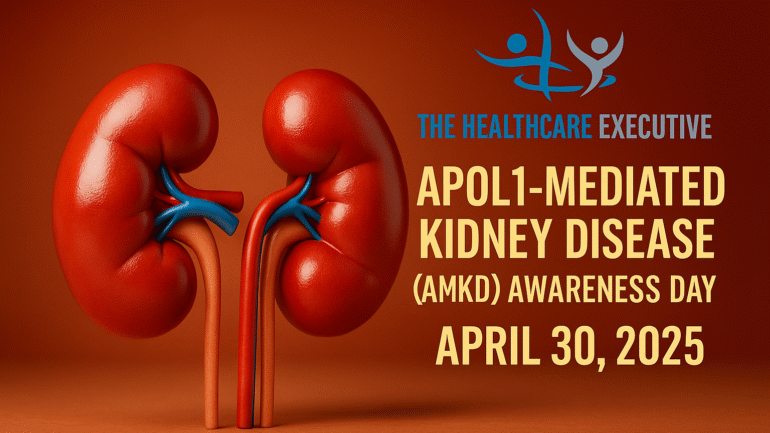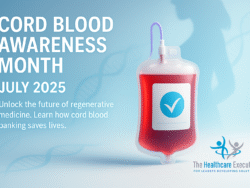APOL1-Mediated Kidney Disease (AMKD) Awareness Day – April 30, 2025

- Posted by Greg Wahlstrom, MBA, HCM
- Posted in Health Observance Calendar
AMKD and Health Equity: Executive Strategies for Rare Disease Recognition
Published: April 30, 2025
APOL1-Mediated Kidney Disease (AMKD) Awareness Day brings to light a rare and often misunderstood condition that disproportionately affects people of African descent. As a genetically linked disorder tied to variants in the APOL1 gene, AMKD has profound implications for health equity and systemic bias in diagnostics. Many patients are misdiagnosed or underdiagnosed, leading to avoidable progression of kidney disease and poorer health outcomes. In 2025, executive leaders in healthcare must take steps to bring this disease to the forefront of organizational strategy. Institutions such as Mount Sinai have partnered with researchers to advance early detection programs and provide targeted genetic education for nephrology teams. For health systems serving diverse populations, this is not a theoretical issue—it’s a clinical, ethical, and community imperative. Raising awareness is only part of the solution. The deeper challenge lies in redesigning care models that center patient ancestry, access, and genomic risk. That starts with leadership willing to challenge the status quo.
As health equity takes center stage, AMKD serves as a case study for the importance of culturally responsive care and genomic literacy. Hospital boards and C-suite executives are in a unique position to fund outreach, sponsor training, and update risk assessment protocols. Executives at Johns Hopkins Medicine are integrating APOL1 screenings into electronic health records to flag high-risk individuals early. These initiatives require alignment across medical, compliance, and IT departments—driven by leadership that prioritizes population-specific outcomes. Healthcare leaders can also forge collaborations with community organizations and faith-based groups to close the awareness gap. It is not enough to recognize April 30 as an observance; real impact demands systemic changes that endure beyond a single calendar day. Health systems should treat AMKD awareness as a benchmark for how they address all rare and racially linked diseases. When executives lead on this issue, the message is clear: every patient deserves precision care rooted in truth, not assumptions.
Innovation is also key to improving AMKD outcomes. Several leading systems are using AI to model kidney risk based on genetic markers and social determinants of health. Institutions like UCLA Health are incorporating ancestry-informed algorithms into nephrology decision support tools. These platforms are essential for correcting diagnostic delays and minimizing bias in care delivery. But the success of these tools hinges on executive endorsement and integration into clinical workflows. Beyond tech, health leaders must champion grant applications, patient navigation teams, and culturally specific education materials. Hospitals should also revise payer strategies to ensure that APOL1-related screenings and follow-up care are covered and documented as medically necessary. The result is a system that respects genetic diversity as a pillar of evidence-based care. This is more than innovation—it’s course correction for generations of inequitable outcomes.
In 2025, AMKD also represents a frontier in ethical genomics. With the rise of precision medicine, healthcare leaders are tasked with navigating privacy, consent, and trust-building—especially in communities that have historically experienced medical exploitation. As shown in efforts at Duke Health, transparent communication about genetic data and clear boundaries around its use are central to AMKD strategy. Executives must provide oversight that safeguards genetic data while promoting responsible research and treatment development. It’s a delicate balance between data-sharing and protection, and one that only works with leadership accountability. AMKD also underscores the need for representation in clinical trials and genetic databases. Without it, therapeutic progress stalls and disparities persist. Board members, legal teams, and compliance officers must work together to codify ethical standards for rare disease care. These governance structures can become a model for genomics-based population health across the country.
As we observe APOL1-Mediated Kidney Disease (AMKD) Awareness Day, healthcare executives are called to lead with intention and insight. This is a leadership issue, not just a clinical one. From funding APOL1 testing in underserved clinics to elevating staff education and revising organizational policy, the path forward requires vision from the top. Health systems that lead on AMKD will set the tone for equity-driven genomics. The future of nephrology—and healthcare as a whole—hinges on our ability to integrate ancestry, innovation, and accountability. Patients at risk for AMKD are not invisible. They are waiting to be seen, heard, and treated. Leadership that answers that call will define the next era of care. Because where precision meets equity, trust is built and lives are saved.
Discover More:
Explore how hospitals are addressing rare diseases through innovation, equity, and genomic-based care redesign.
Internal Links
- World Leprosy Day 2025: Unite, Act, Eliminate
- National Donor Day 2025: Building Trust in Transplant Equity
- World Birth Defects Day 2025: Prevention and Policy in Focus



